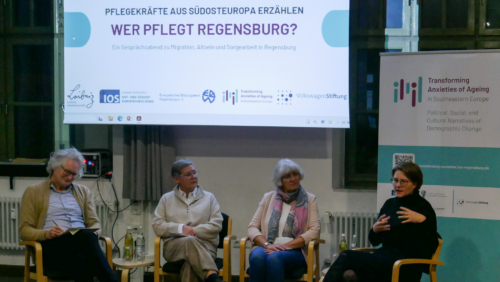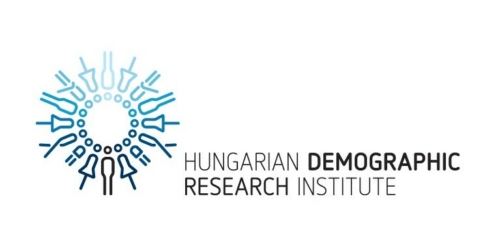Public Discussion: “Who Cares for Regensburg? Care Workers from Southeastern Europe Share Their Stories”
21 October 2025, Regensburg
On 21 October 2025, the Leibniz Institute for East and Southeast European Studies (IOS) and the Evangelisches Bildungswerk Regensburg (EBW) jointly hosted the public discussion “Who Cares for Regensburg? Care Workers from Southeastern Europe Share Their Stories.” The event, held in German, highlighted the indispensable yet often invisible contributions of care workers from Southeastern Europe to Regensburg’s hospitals, elder-care facilities, and home-care services.
As part of the Volkswagen Foundation–funded IOS research project Transforming Anxieties of Ageing in Southeastern Europe, the evening began with anonymised interview excerpts presented by Dr. Kathleen Randýsek Beger, coordinator of the project. These narratives offered authentic insights into the motivations, working conditions, and emotional challenges of migrant caregivers—including homesickness, loneliness, and uncertainty. At the same time, many interviewees expressed deep pride and compassion, emphasising how meaningful it is to offer older adults not only professional support but also a sense of home, stability, and dignity in the final stage of life.
A panel discussion followed, featuring:
- Silvia Berthold, Head of the Care Department, Senior Citizens’ Office, City of Regensburg
- Daniela Hartl-Göthner, Deputy Head of Nursing Management, Hospital “Barmherzige Brüder” Regensburg
- Prof. Dr. Annette Meussling-Sentpali, Professor of Nursing Science, Ostbayerische Technische Hochschule (OTH) Regensburg (Regensburg University of Applied Sciences)
The discussion was originally scheduled to be moderated by Dr. Carsten Lenk, Managing Director of the EBW, who was unfortunately unable to attend. Prof. Dr. Ulf Brunnbauer, Director of the IOS and leader of the project Transforming Anxieties of Ageing in Southeastern Europe, kindly took over the moderation.
Daniela Hartl-Göthner pointed out that international recruitment for care workers has become highly professionalised and increasingly global. Today, most newly recruited caregivers in Regensburg and across Germany come from countries such as Tunisia, India, Indonesia, and the Philippines. These recruitment pathways are organised through structured international programmes such as Triple Win, intended to benefit the destination country (Germany), the countries of origin, and the migrant workers themselves, while helping address Germany’s growing need for skilled care personnel.
The discussion round: Ulf Brunnbauer, Annette Meussling-Sentpali, Silvia Berthold, Daniela Hartl-Göthner (L to R)
Copyright: IOS/Kurz
Prof. Ulf Brunnbauer noted the disconnect between public migration debates and Germany’s real labour needs, emphasising that while political attention often fixates on irregular migration, the care sector depends fundamentally on legal labour migration. He also stressed that regions hostile to immigration only worsen their own care shortages, while many sending countries—particularly in Southeastern Europe, with Serbia even withdrawing from the Triple Win programme—struggle with demographic decline and cannot easily spare trained nursing staff.
Both Silvia Berthold and Prof. Meussling-Sentpali emphasised that many migrant caregivers initially struggle with the German language and require structured support to acquire it. Research has shown that some older residents feel uneasy or excluded when caregivers speak in their native language rather than German. At the same time, the panel stressed that caregivers from different parts of the world bring invaluable strengths to Germany’s increasingly diverse society. Their cultural and linguistic backgrounds help ensure that hospitals and care homes can respond to the needs of residents with a wide range of migration histories, reflecting the reality of a heterogeneous population.
Together with contributions from the audience, the panel explored how migration continues to reshape the local care sector, what support structures are needed to ensure fair working conditions and long-term retention, and how care work can be organised sustainably in an ageing society.
These developments mirror broader national and European trends, where Germany’s reliance on foreign care workers stands in contrast to the demographic decline in many sending countries. As discussed by the panel, migrant caregivers remain essential to sustaining care provision in Regensburg and its surrounding region.
The importance of these discussions was also reflected in media coverage from several regional and church-affiliated outlets, which reported on the event and its key themes (in German):
Wer pflegt Regensburg? Gesprächsabend rückt übersehene Pflegekräfte aus Südosteuropa in den Fokus
Wer pflegt das ergraute Europa?
Pflegenotstand droht: Deutschland hängt von ausländischen Fachkräften ab
Konkurrenz um Pflegekräfte aus Ost- und Südosteuropa wird größer
Pflege in Regensburg: Zwischen Perspektivlosigkeit und Sprachbarrieren
Through this cooperation between EBW and IOS, the event created a much-needed public forum for acknowledging the essential contributions of migrant caregivers and discussing what is required to secure dignified, sustainable care in an increasingly diverse and ageing society.






